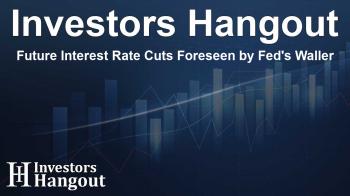Future Interest Rate Cuts Foreseen by Fed's Waller

Federal Reserve Governor's Optimism on Interest Rates
Federal Reserve governor Christopher Waller has expressed a hopeful outlook regarding the potential for interest rate cuts in the foreseeable future. According to Waller, the expected decrease in inflation rates in the coming years could pave the way for the Federal Reserve to further lower interest rates, although the timing and extent of these cuts remain uncertain.
Inflation Trends and Economic Indicators
Waller has pointed out that although inflation levels were seen plateauing above the Fed's target of 2% by the end of the previous year, he remains optimistic due to various economic indicators. These include market-based predictions and short-term inflation metrics that hint at a continuing downward trend in inflation, despite some unpredictability in the improvement rate.
Insights From the OECD Event
During a recent event organized by the Organization for Economic Cooperation and Development, Waller discussed the challenges in reducing the policy rate. He emphasized his belief that inflation will align closer to the 2% target over the medium term and that necessary rate reductions would be possible.
Anticipated Cuts and Current Policy Rates
Waller indicated that the extent of future rate cuts will depend largely on how effectively inflation is being managed and if the labor market remains strong. Last year, in the final three meetings, the Federal Reserve had already reduced its policy interest rate by a total of one percentage point. For the upcoming policy meeting at the end of January, it is anticipated that the Fed will maintain the interest rates within the 4.25% to 4.5% bracket.
Views Among Fed Officials
While Waller did not provide a precise forecast regarding the number of cuts to expect this year, he acknowledged the diversity of opinions among Federal Reserve officials. Some predict no cuts, while others suggest the possibility of reducing rates by up to five times, which would decrease the Fed's policy rate by an additional 1.25 percentage points.
Economic Robustness and Labor Market Stability
The hesitation among Fed officials to rigorously commit to additional cuts is linked to the economy's strong performance. Continued economic growth, which has surpassed long-term potential estimates alongside consistent hiring and wage increases, supports healthy consumer spending and contributes to overall economic strength.
Monitoring Potential Economic Changes
Waller reiterated his faith in the stability of the U.S. economy, noting that there is currently no significant data indicating a major weakening in the labor market on the horizon. Furthermore, he highlighted the upcoming job data release for December, which could provide further insights into economic trends.
Potential Effects of Political Changes
Given the changes that may come with a new administration, Federal Reserve policymakers are actively considering the potential impacts on the economy. Waller noted that while rising tariffs could pose inflationary risks, he does not foresee them leading to a prolonged surge in price pressures or altering his stance on suitable monetary policy in a significant way.
Frequently Asked Questions
What is Christopher Waller's role in the Federal Reserve?
Christopher Waller is a governor of the Federal Reserve, providing insights and guidance on monetary policy.
What are Waller's thoughts on future interest rate cuts?
Waller believes that further interest rate cuts may occur if inflation continues to decline and the economy remains stable.
Why are future interest rate cuts uncertain?
The uncertainty stems from unpredictable inflation rates and varying opinions among Federal Reserve officials regarding the appropriate course of action.
How does economic performance affect interest rates?
Strong economic performance and labor market stability can influence the Fed's decision on whether to adjust interest rates.
What factors are Federal Reserve policymakers monitoring?
Policymakers are closely monitoring inflation trends, job market data, and potential economic changes that could impact monetary policy.
About The Author
Contact Henry Turner privately here. Or send an email with ATTN: Henry Turner as the subject to contact@investorshangout.com.
About Investors Hangout
Investors Hangout is a leading online stock forum for financial discussion and learning, offering a wide range of free tools and resources. It draws in traders of all levels, who exchange market knowledge, investigate trading tactics, and keep an eye on industry developments in real time. Featuring financial articles, stock message boards, quotes, charts, company profiles, and live news updates. Through cooperative learning and a wealth of informational resources, it helps users from novices creating their first portfolios to experts honing their techniques. Join Investors Hangout today: https://investorshangout.com/
The content of this article is based on factual, publicly available information and does not represent legal, financial, or investment advice. Investors Hangout does not offer financial advice, and the author is not a licensed financial advisor. Consult a qualified advisor before making any financial or investment decisions based on this article. This article should not be considered advice to purchase, sell, or hold any securities or other investments. If any of the material provided here is inaccurate, please contact us for corrections.

